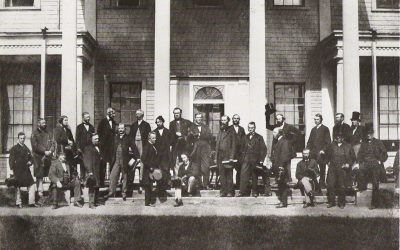Amidst all the current electioneering on both sides of the 49th parallel, we can be sure of one thing: there will be widespread disappointment with the results, both short and long-term, among both winners and losers. Why are democratic systems so persistently the source of dismay and frustration? Bryan Caplan, in his book The Myth of the Rational Voter: Why Democracies Choose Bad Policies, has an arresting answer: they give us what we ask for! “Good intentions are ubiquitous in politics,” he writes, “what is scarce is accurate beliefs.”
Four years ago, New Yorker writer James Surowiecki published a book called The Wisdom of Crowds, in which he pushed the joys of collective decision-making. His thesis was based on the so-called “Miracle of aggregates.” When people are asked to guess the weight of an ox or the number of jelly beans in a jar, their average guess tends to be remarkably accurate. Mr. Surowiecki suggests that this provides support for the democratic mode of government. But while democracy may be better than the alternatives, aggregating wisdom is certainly not its forte.
Mr. Surowiecki’s suggests that “we are products of evolution, and presumably we have been equipped to make sense of the world around us.” No presumption could be more wrong. We are indeed products of evolution, and we have an intuitive sense of number and physics that helps when assessing jelly beans and oxen, but biological evolution is a very slow process, while social and cultural evolution has been accelerating, creating the paradox of the fact that we live — and thrive — in a world we largely do not understand.
Mr. Caplan points out that under the naïve public interest view of democracy, the system works because it reflects “the will of the people.” The cynical alternative, known as “public choice,” suggests that the system has been captured by the political and bureaucratic classes who act primarily in their own interests. Individuals, meanwhile, are “rationally ignorant” because it just isn’t worth the time and trouble to study myriad complex issues. Mr. Caplan’s take, by contrast, is that the danger to democracy is not from politicians ignoring the man in the street, but from their catering to his delusions, which they may well share. Those delusions consist of a number of “belief preferences” that point away from sensible policy: anti-market bias, anti-foreign bias, make work bias, and pessimistic bias.
Anti-market and anti-foreign biases explain the widespread failure to understand the role of profits and the importance of trade. The make-work bias assumes that prosperity is associated with employment rather than productivity and output. Thus the “loss” of jobs in any particular company or industry is treated as a “bad thing,” requiring government intervention. Similarly, the Luddite fear that new technology will “destroy” jobs permanently appears with each generation. “Downsizing” and “offshoring” are also seen as trends that should be stopped. Meanwhile, over all lurks a constant tendency to imagine that things are worse than they are, and destined to get worse still, which perhaps explains the malignant reach of “climate crisis” hysteria.
Given this public bias, the real wonder is why democratic governance is not worse. According to Mr. Caplan, the answer is that wise, charismatic, market-savvy leaders can sometimes persuade followers to override their prejudices. This may be Stephen Harper’s problem. He is both politically and economically savvy, but is held back both by public prejudice and his lack of cuddly qualities. Of course he has a secret agenda! He has to keep it a secret because it represents an unacceptable reality!
Mr. Caplan concludes that those who seek to fiddle with electoral systems, for example by introducing proportional representation or reforming campaign finances, are misguided. Meanwhile, those who seek salvation in getting more non-voters to the polls are in fact promoting disaster, since non-voters tend to be less educated and thus even more likely to embrace dangerous ideas (which is why Al Gore stressed getting the youth to the polls in Denver on Thursday night).
Mr. Caplan suggests that the only hope for improving the system lies in increasing economic education, so we can begin to perceive where our true interests lie, but even economists often do not see the systematic biases of which Mr. Caplan speaks, preferring the warm feeling of being seen as “compassionate.”
If democratic systems do evolve, they do so because of the periodical possibility of throwing the rascals out, and because in the end there must be some grudging realization by some in the political class about the way the world works.
Mr. Caplan’s book provides much-needed insight into why capitalism promotes democracy but democracy does not necessarily return the favour. It also promotes the heretical thought that weakening democracy in favour of markets might not be such a bad idea. People may sometimes behave irrationally in markets, but they are inclined to promote much more irrational behaviour in the political arena. That’s because they are spending other peoples’ money.


